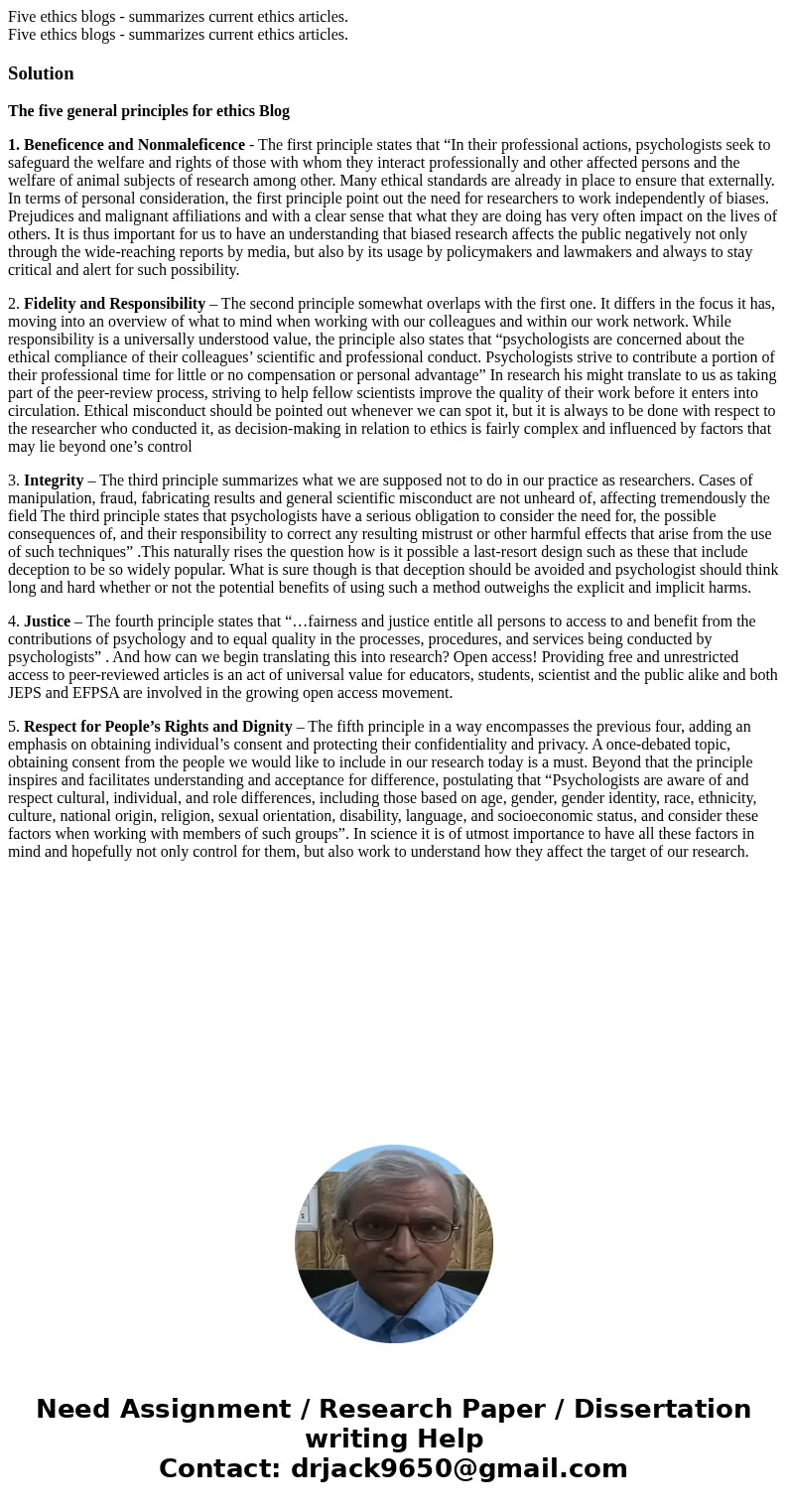Five ethics blogs summarizes current ethics articles Five e
Solution
The five general principles for ethics Blog
1. Beneficence and Nonmaleficence - The first principle states that “In their professional actions, psychologists seek to safeguard the welfare and rights of those with whom they interact professionally and other affected persons and the welfare of animal subjects of research among other. Many ethical standards are already in place to ensure that externally. In terms of personal consideration, the first principle point out the need for researchers to work independently of biases. Prejudices and malignant affiliations and with a clear sense that what they are doing has very often impact on the lives of others. It is thus important for us to have an understanding that biased research affects the public negatively not only through the wide-reaching reports by media, but also by its usage by policymakers and lawmakers and always to stay critical and alert for such possibility.
2. Fidelity and Responsibility – The second principle somewhat overlaps with the first one. It differs in the focus it has, moving into an overview of what to mind when working with our colleagues and within our work network. While responsibility is a universally understood value, the principle also states that “psychologists are concerned about the ethical compliance of their colleagues’ scientific and professional conduct. Psychologists strive to contribute a portion of their professional time for little or no compensation or personal advantage” In research his might translate to us as taking part of the peer-review process, striving to help fellow scientists improve the quality of their work before it enters into circulation. Ethical misconduct should be pointed out whenever we can spot it, but it is always to be done with respect to the researcher who conducted it, as decision-making in relation to ethics is fairly complex and influenced by factors that may lie beyond one’s control
3. Integrity – The third principle summarizes what we are supposed not to do in our practice as researchers. Cases of manipulation, fraud, fabricating results and general scientific misconduct are not unheard of, affecting tremendously the field The third principle states that psychologists have a serious obligation to consider the need for, the possible consequences of, and their responsibility to correct any resulting mistrust or other harmful effects that arise from the use of such techniques” .This naturally rises the question how is it possible a last-resort design such as these that include deception to be so widely popular. What is sure though is that deception should be avoided and psychologist should think long and hard whether or not the potential benefits of using such a method outweighs the explicit and implicit harms.
4. Justice – The fourth principle states that “…fairness and justice entitle all persons to access to and benefit from the contributions of psychology and to equal quality in the processes, procedures, and services being conducted by psychologists” . And how can we begin translating this into research? Open access! Providing free and unrestricted access to peer-reviewed articles is an act of universal value for educators, students, scientist and the public alike and both JEPS and EFPSA are involved in the growing open access movement.
5. Respect for People’s Rights and Dignity – The fifth principle in a way encompasses the previous four, adding an emphasis on obtaining individual’s consent and protecting their confidentiality and privacy. A once-debated topic, obtaining consent from the people we would like to include in our research today is a must. Beyond that the principle inspires and facilitates understanding and acceptance for difference, postulating that “Psychologists are aware of and respect cultural, individual, and role differences, including those based on age, gender, gender identity, race, ethnicity, culture, national origin, religion, sexual orientation, disability, language, and socioeconomic status, and consider these factors when working with members of such groups”. In science it is of utmost importance to have all these factors in mind and hopefully not only control for them, but also work to understand how they affect the target of our research.

 Homework Sourse
Homework Sourse